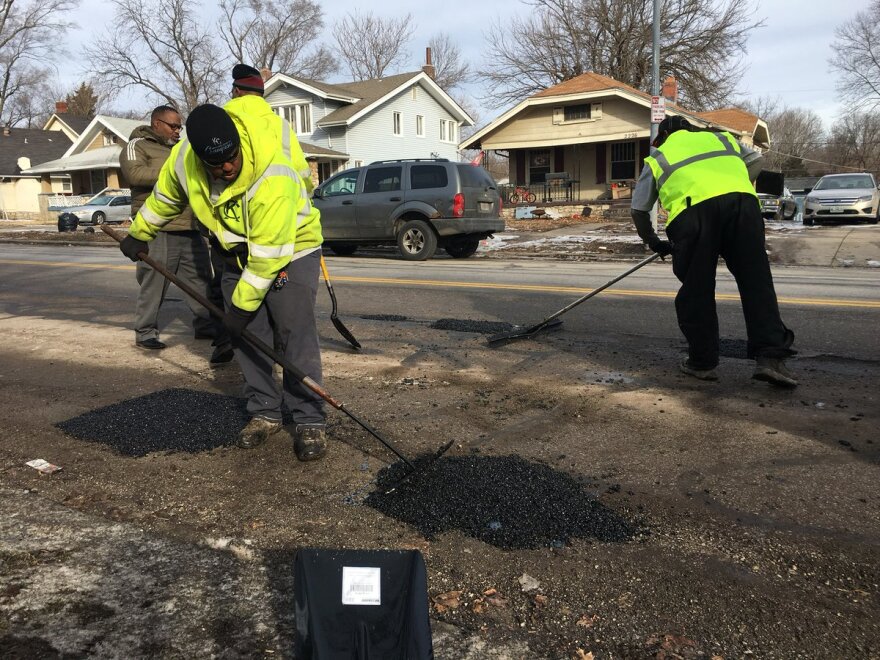There comes a turning point in many wars when leaders are forced to acknowledge the reality of their situation. In Kansas City, Missouri, it was last week when Deputy Director of Public Works Ralph Davis admitted at a City Council meeting: "We're losing the pothole war really, really, really bad."
This is what the battlefield looks like the first week of March:
In Numbers: Wounds to the streets
Pothole complaints to Kansas City's 311 Action Center are at their highest since at least 2015. The city has recorded 2,029 calls since the beginning of December, nearly four times as many as last year. Half of those have been resolved.
On days that are warm enough, the city has dispatched public works crews to triage and repair the damage. They filled an estimated 11,444 potholes in December and January, and 7,269 in half of February.

The Second Front: When drivers fight the city
Sometimes swerving isn’t enough to avoid potholes. When a deep pothole punctures a tire or bends a wheel rim, some drivers take the fight to the city. So far this year, 192 people have filed claims asking the city to cover their car repairs. That's more than double the number for any of the last three years.
But Kansas City defends itself by saying that, in order for a driver to be compensated, the city must have known about the pothole before the driver hit it.
Bonjwing Lee, a former attorney (and contributing KCUR food critic) says that after a pothole damaged his car, city officials rejected his request to pay for the repairs because they had no proof that the pothole existed before Lee’s report. Lee says he's skeptical that no one had reported it, given its size.
“I realized that the city has a very convenient excuse for not being accountable for reimbursing people for the damages caused by the roads that they are not repairing in a timely fashion because we don’t have proof that they did not have prior notice,” he said.
Lee launched an insurgency, publicly posting a picture of a letter he sent to the city listing the potholes he’s driven past. He’s encouraging others to do the same, to establish a public record besides 311 calls.
City spokesperson Maggie Green told KCUR in a written statement that “This decision (to reimburse drivers) is based on several factors, including whether the City had sufficient opportunity to repair the area prior to the incident. The City tries to repair potholes as quickly as possible.”
None of the 192 claims made so far this year have been paid yet; the city is still processing incoming claims. In 2018, the city paid 4 out of 44 claims.
More money but not enough troops
Kansas City’s proposed street preservation budget this year is $17 million, up from $10.8 million last year. This year’s increase is significant: the 2018-2019 amount was only a $2 million increase from the year before.
Despite their bigger war chest, city officials are short on troops: The workers who fill the potholes are the same ones plowing snow. Meanwhile, not all public works positions are filled and city officials are getting desperate.
“We have 30 openings in public works alone right now, so if you’re interested….” city spokesman Chris Hernandez quipped to reporters at a pre-snow-storm press conference in February.

The long path to victory
All over the country, cities are experimenting with innovative data and technological approaches to fighting pothole wars. Last year Kansas City made news for its use of a predictive pothole program, one that used data to spot potential potholes before they appeared.
Last week, public works announced that the city had scrapped it. Green says this was because the pilot program identified locations that the city already knew needed repair.
Meanwhile, the city is testing gel-filled Thump Pads as temporary fixes.
Thump Pads are being used in some potholes. A Thump Pad is an all-weather, reusable, temporary pothole repair product. It is a shock-absorbing pad that effectively pillows the shock of driving over a pothole. #KCStat pic.twitter.com/zmqDOBVQwN
— Kansas City, MO (@KCMO) March 5, 2019
Public works inspectors carry shock-absorption packs with them to throw into potholes they see until crews can patch them. The pads help cars get over potholes safely.
As for how to drive in these circumstances, there’s not much you can do besides slow down or swerve. But don’t brake while driving over the pothole. Hold the wheel firmly to avoid losing control.
As Sir Winston Churchill said in 1940, in a rousing address during World War II, “We shall fight… in the streets… we shall never surrender.”
Sonia Schlesinger is an intern at KCUR 89.3. Reach her at sonia@kcur.org.




